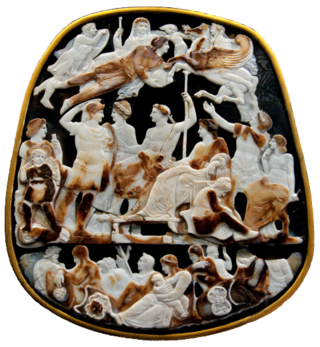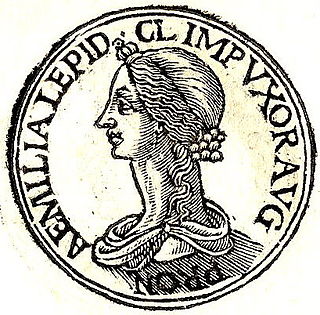Related Research Articles

Julia Agrippina, also referred to as Agrippina the Younger, was Roman empress from 49 to 54 AD, the fourth wife and niece of Emperor Claudius, and the mother of Nero.

The Julio-Claudian dynasty comprised the first five Roman emperors: Augustus, Tiberius, Caligula, Claudius, and Nero.

The gens Petronia was a plebeian family at ancient Rome. This gens claimed an ancient lineage, as a Petronius Sabinus is mentioned in the time of Lucius Tarquinius Superbus, the last of the Roman kings, but few Petronii are mentioned in the time of the Republic. They are frequently encountered under the Empire, holding numerous consulships, and eventually obtaining the Empire itself during the brief reign of Petronius Maximus in AD 455.

Gnaeus Domitius Ahenobarbus was a member of the imperial Julio-Claudian dynasty of Ancient Rome. Domitius was the son of Antonia Major. He married Agrippina the Younger and became the father of the emperor Nero.

Domitia was the oldest child of Antonia Major and Lucius Domitius Ahenobarbus, and the oldest granddaughter to triumvir Mark Antony by Octavia Minor, a great-niece of the Roman Emperor Augustus, first cousin once removed to the Emperor Caligula, first cousin to the Emperor Claudius, maternal aunt to the Empress Valeria Messalina, and paternal aunt to Emperor Nero.
Junia Calvina was a Roman noblewoman who lived in the 1st century AD.
Publius Pomponius Secundus was a distinguished statesman and poet in the reigns of Tiberius, Caligula, and Claudius. He was suffect consul for the nundinium of January to June 44, succeeding the ordinary consul Gaius Sallustius Crispus Passienus and as the colleague of the other ordinary consul, Titus Statilius Taurus. Publius was on intimate terms with the elder Pliny, who wrote a biography of him, now lost.
Appius Junius Silanus, whom Cassius Dio calls Gaius Appius Silanus, was consul in AD 28, with Publius Silius Nerva as his colleague. He was accused of majestas, or treason, in AD 32 along with a number of senators, but he and Gaius Calvisius Sabinus were saved by one of the informers, Celsus, a tribune of a city cohort.
Quintus Pomponius Secundus was a Roman aristocrat of the first century, and consul suffectus in AD 41 as the colleague of Gnaeus Sentius Saturninus. His brother was the poet and statesman Publius Pomponius Secundus, and their half-sister, Milonia Caesonia, was the second wife of the emperor Caligula.
The gens Octavia was a plebeian family at ancient Rome, which was raised to patrician status by Caesar during the first century BC. The first member of the gens to achieve prominence was Gnaeus Octavius Rufus, quaestor circa 230 BC. Over the following two centuries, the Octavii held many of the highest offices of the state; but the most celebrated of the family was Gaius Octavius, the grandnephew and adopted son of Caesar, who was proclaimed Augustus by the senate in 27 BC.

Aemilia Lepida was a noble Roman woman and matron. She was the first great-grandchild of the Emperor Augustus.
Lucius Arruntius Camillus Scribonianus was a Roman senator, who was active during the reign of Tiberius. He was consul in AD 32. Ten years later, he revolted against the emperor Claudius, but was swiftly defeated.

The gens Vibia was a plebeian family at ancient Rome. Although individuals named Vibius appear in history during the time of the Second Punic War, no members of this gens are found at Rome until the final century of the Republic. The first of the Vibii to obtain the consulship was Gaius Vibius Pansa in 43 BC, and from then until imperial times the Vibii regularly filled the highest offices of the Roman state. The emperors Trebonianus Gallus and Volusianus each claimed descent from the family.
Gaius Memmius Regulus was a first-century Roman senator. He was ordinary consul in AD 63, with Lucius Verginius Rufus as his colleague.
The gens Arruntia was a plebeian family at ancient Rome. Members of this gens first came to prominence during the final years of the Republic.
The gens Caecinia was a plebeian family of Etruscan origin at ancient Rome. Members of this gens are first mentioned in the time of Cicero, and they remained prominent through the first century of the Empire, before fading into obscurity in the time of the Flavian emperors. A family of this name rose to prominence once more at the beginning of the fifth century.
The gens Cluvia was a plebeian family at ancient Rome, known from the later Republic, and early imperial times. The first member of the gens to achieve prominence was Gaius Cluvius Saxula, praetor in 175 and 173 BC.
The gens Domitia was a plebeian family at ancient Rome. The first of the gens to achieve prominence was Gnaeus Domitius Calvinus, consul in 332 BC. His son, Gnaeus Domitius Calvinus Maximus, was consul in 283, and the first plebeian censor. The family produced several distinguished generals, and towards the end of the Republic, the Domitii were looked upon as one of the most illustrious gentes.
Lucius Annius Vinicianus was a Roman senator during the Principate. He is best known for his involvement in the assassination of Caligula and a rebellion against Claudius.
The gens Sallustia, occasionally written Salustia, was a plebeian family at ancient Rome. Members of this gens are first mentioned in the time of Cicero, and from that time they attained particular distinction as statesmen and writers. The most illustrious of the family was the historian Gaius Sallustius Crispus, who wrote valuable works on the Jugurthine War and the Conspiracy of Catiline, which still exist.
References
- 1 2 3 4 5 Suetonius, "The Life of Passienus Crispus".
- ↑ Tacitus, Annales, iii. 30.
- ↑ PIR, vol. III, p. 14.
- ↑ Attilio Degrassi, I fasti consolari dell'Impero Romano dal 30 avanti Cristo al 613 dopo Cristo (Rome, 1952), p. 9
- ↑ Settipani, Christian (2000). Continuité gentilice et continuité familiale dans les familles sénatoriales romaines à l'époque impériale: mythe et réalité. Prosopographica et genealogica (in Italian). Vol. 2 (illustrated ed.). Unit for Prosopographical Research, Linacre College, University of Oxford. p. 304. ISBN 9781900934022.
- ↑ Tacitus, Annales, vi. 4.
- ↑ Gallivan, "The Fasti for the Reign of Claudius", p. 409.
- ↑ Settipani, Christian. Continuité gentilice et continuité sénatoriale dans les familles sénatoriales romaines à l'époque impériale (2000), vol. 2, Addenda et Corrigenda, p. 74
- ↑ Suetonius, "The Life of Nero", 5.
- ↑ Cassius Dio, lix. 11, 22.
- ↑ Suetonius, "The Life of Gaius", 24.
- ↑ Suetonius, "The Life of Nero", 6.
- ↑ Cassius Dio, lx. 4.
- ↑ Ronald Syme, "Problems about Proconsuls of Asia", Zeitschrift für Papyrologie und Epigraphik , 53 (1983), p. 195
- ↑ Syme, Tacitus (Oxford: Clarendon Press, 1958), p. 72
- ↑ Cassius Dio, lx. 23.
- ↑ Gallivan, "The Fasti for the Reign of Claudius", p. 408.
- ↑ Tacitus, Annales, vi. 20 (J. Jackson, trans.).